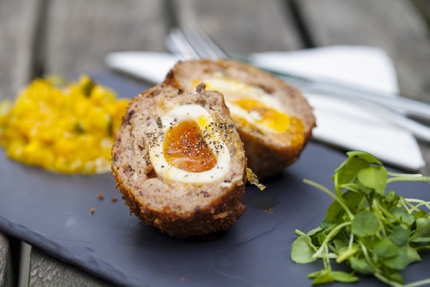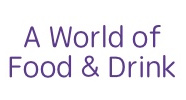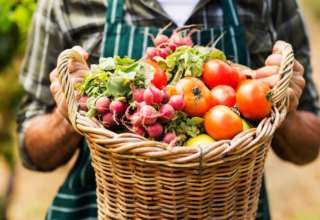Chicken eggs are nutritious and versatile, but are they good or bad for you?
If there’s one food item that springs to mind as a universal staple in the culinary world, it may well be eggs – and we are referring to chicken eggs in this article.
These familiar oval shells of yolk and white are used in savoury and sweet recipes alike – as the main attraction, the indulgent side offering, or the hidden hero that binds different components together during baking and cooking.
With the right treatment, eggs can also be miraculously whipped up into foods that bear little resemblance to their original forms, like meringues and mayonnaise. And, of course, simply boiling, frying, scrambling or poaching them on their own yields delicious results too. But for all their versatility, eggs do have some downsides. Here’s a breakdown of almost everything you should know about eggs, along with whether they really are good or bad.
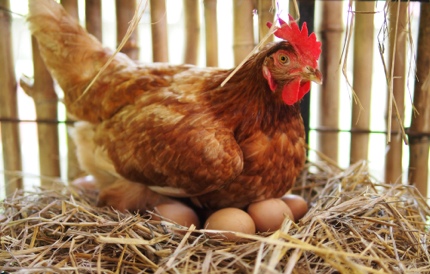
A brief history of eggs
Humans are thought to have enjoyed eggs since the dawn of our existence. Our cave-dwelling ancestors probably discovered that eggs were a rich (and delicious) nutritional source and would initially eat them raw, plucked from wild nests.
As humans progressed, our forefathers started to plant crops and domesticate animals – archaeological evidence suggests that the Chinese started to raise hens more than 5,000 years ago (or possibly earlier), with countries in the Middle East and Europe following suit.
In ancient Egypt, they even devised an artificial incubator – essentially a mud oven with a good combination of heat and moisture – to hatch thousands of eggs in just a few weeks. Today, some rural communities in Egypt still use this ingenious device to meet the demand for poultry.
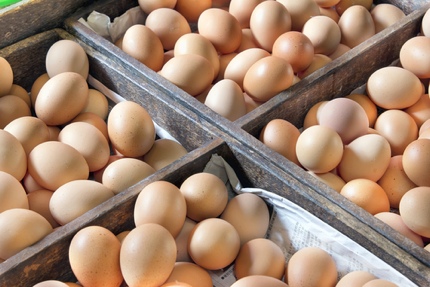
The controversy of cage egg farming
In the 1950s and 60s, in response to the ever-growing demand for eggs, cage egg farming began to take place around the world. Factories were designed to churn out as many eggs as possible for as little cost, and this often meant confining too many hens in tightly-packed cages that restrict almost all movement, causing various health problems such as feather loss and brittle bones, as well as giving them mental distress. Needless to say, this type of intensive farming is unethical and also pretty bad for the environment. The prime problem of the latter lies with the ingredients of conventional hen feed, which are mostly made of cereal grains that require a vast swath of land to cultivate and have contributed to deforestation.
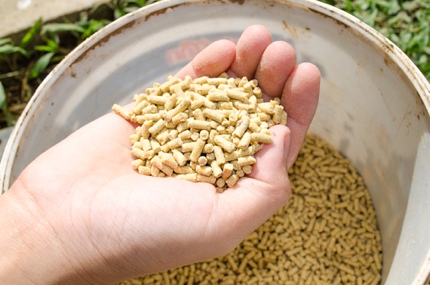
In recent years, unfavourable news of cage egg farming has received prominence in media coverage, resulting in many consumers shunning eggs from caged hens. To tackle the issue, several countries have now published a code of practice for the welfare of laying hens respectively. In England, for instance, the Department for Environment, Food & Rural Affairs has a 41-page document detailing lighting, climate control, and the minimum space allowance per hen in a cage. In reality, however, not all farms have followed the guidelines diligently.
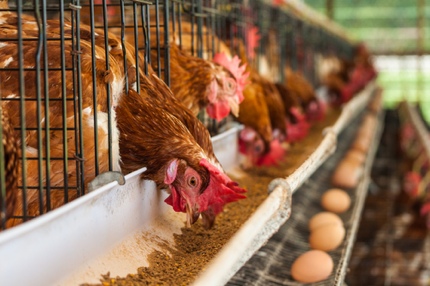
Free-range and organic
As some people try to move away from consuming caged eggs, free-range and organic eggs have become increasingly popular choices. But what’s the difference between them? While free-range hens have access to the outdoors during the day and are housed inside at night, there’s sometimes little space for them to actually move around, and the practice isn’t always properly regulated.
Organic eggs are similar to free-range in that the hens are allowed to roam free outside, but they aren’t given genetically modified feed or antibiotics – the norm for caged and free-range flocks. Organic hens also tend to be reared in smaller groups.

Depending on where you are, you may find other egg labels available, including omega-3 enriched, barn-laid, pasture-raised, hormone-free, and even vegetarian eggs (from hens that are fed a plant-based diet). Beware that some of these labels can be confusing, while others could include misleading terms. It’s always worth doing some research into each type if you want to find the best egg for you, and one that actually has animal welfare and sustainability at its heart – factors that are becoming ever more important for conscious egg consumers.
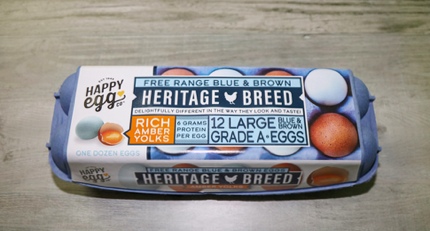
Are eggs good for you?
Many people tout the advantages of eating eggs: they are a good source of protein (a large egg has about 6 grams), as well as vitamin D for a healthy immune system, and choline, which boosts metabolism and liver function, among other benefits. They are also low in calories, with an average egg containing around 78, making them an excellent choice for a light and nutritious meal or snack.
One caveat of eggs, many would argue, is their cholesterol content. Cholesterol is a fatty substance that can build up in the blood vessels and increase the risk of heart attacks and stroke, and each egg yolk contains about 185 milligrams of cholesterol, which is more than half the US daily recommended amount. This has led to some fears that eggs might not be as good for us as we first thought. However, many organisations, including the British Heart Foundation, have come out to dispel the misconception. It turns out that cholesterol in food has a negligible effect on one’s blood cholesterol levels. Instead, it is far more important to watch out for saturated fats, which, fortunately, eggs don’t contain much of.
In other words, eggs are nutritious and good for you, as long as you pay attention to how you prepare them. For example, boiling or poaching eggs is a healthier option than frying them in butter as it reduces the fat you consume by about half. So despite any concerns, you can still enjoy your eggs the sunny way.
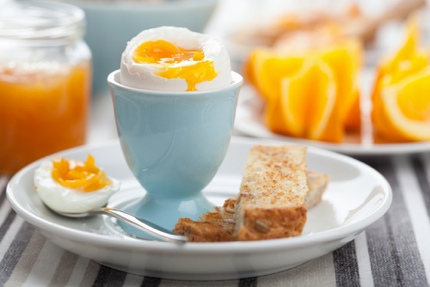
Raw eggs and food poisoning
In 1988, the presence of salmonella in eggs caused the British public to avoid raw eggs, with the stigma lingering for almost three subsequent decades. In 2017, the UK Food Standards Agency (FSA) announced a change to the advice about eating eggs – based on scientific evidence, it declared all ‘Lion Mark’ eggs produced in the UK are free of salmonella. This meant infants, pregnant women and older people, who are vulnerable to infection, could finally eat raw eggs or foods containing them.
So what caused the change? The FSA attributed it to enhanced testing for salmonella, better vaccination of hens, improved hygiene on farms, better shipping and storage, and traceability.

In the US, the Food & Drug Administration (FDA) has yet to confidently make such a bold statement like the British counterpart, but it has required egg producers to pasteurise or wash the eggs with a special type of detergent. What’s more, preventive measures in poultry houses mean that eggs must be refrigerated during transportation and storage.
In Japan and Korea, raw eggs are often included in the diet, and the people in both countries believe that raw eggs are safe, thanks to the stringent regulations that minimise any possible contamination.
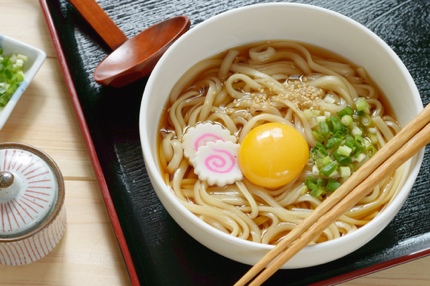
Nonetheless, it must be pointed out that low risk doesn’t mean no risk. There is always a danger of salmonella being present on the eggshell, especially if you prefer to buy from a small farm directly. Thankfully, you can minimise the risk further by discarding cracked or dirty eggs, washing your hands well with soap before and after handling eggs, and cleaning kitchen surfaces and equipment of any raw egg.
The yolk colour
There’s little more satisfying than cutting open a cooked egg to see its bright runny yolk ooze onto the plate – but what makes some yolks so golden? An egg’s centre can take on a whole spectrum of different hues, ranging from the lightest yellow to darkest orange, depending on what the hen eats – if she has a diet rich in pigments known as xanthophylls, then those pigments can be passed to the egg yolk.
The quintessential golden yolks of Burford Brown eggs by British egg supplier Clarence Court, for example, are achieved by feeding their hens a varied diet that includes maize, sunflower, marigold and paprika. Hens that are raised on pasture also tend to produce darker orange yolks.

But does the yolk colour affect the nutritional content? Many scientists insist that there is no link between the two. However, a 2014 study found that if the hens are fed a good diet (including supplements like chia and flaxseed), they tend to lay eggs that have a redder yolk with a higher level of vitamins and omega-3 fatty acids.
One thing to note is that while many farms choose to use natural plant-based ingredients to boost the orange hue of their eggs, unscrupulous producers do use synthetic additives to achieve the deeper coloured yolks desired by consumers.
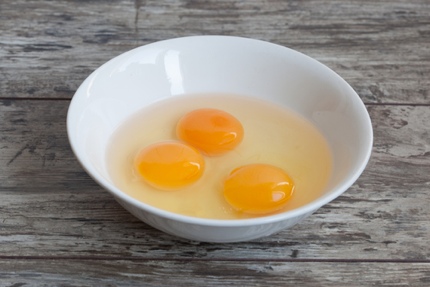
How to store eggs
It’s the age-old question, and one that’s sure to divide a room: do you keep eggs in the fridge or not? The recommendation is to store them in a cool, dry place at a consistent temperature that’s low enough to prevent bacterial growth (such as salmonella), but there are conflicting views about whether the fridge or cupboard is the best choice.
This partly lies with how eggs are treated in different parts of the world. In the US, it’s standard practice to use the fridge since American eggs are pre-washed and refrigerated before they’re sold, whereas countries like the UK and Australia don’t tend to wash their eggs. Some supermarkets also keep a temperature lower than the recommended for storing eggs (in the UK, for example, it’s below 20°C), so fridges aren’t always a necessary precaution.
If you do decide to store your eggs in the fridge, it’s better to keep them in the carton they came in (to protect them from absorbing any odour that may be present in your fridge) and also on the main shelf (for a more consistent temperature to ensure maximum freshness).
No eggs can last forever. If you crack open an egg and see the yolk is discoloured or flat, and the egg white is runnier than usual, then it has probably gone bad.
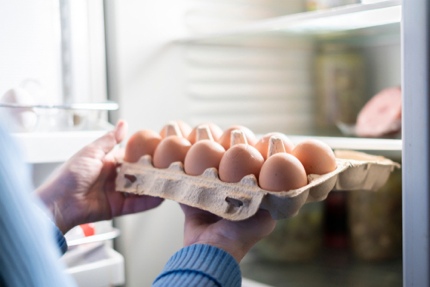
Popular ways to prepare eggs
Everywhere you look, eggs abound: they are firmly rooted in a host of different cuisines and are eaten for every meal and occasion. Unsurprisingly, the way in which people use eggs around the world would appear endless.
Omelettes are a simple yet well-loved recipe for eggs, with many countries offering their own delicious interpretations. The French opt for a classic version using just whisked-up eggs and butter, while in Japan, mirin – a sweet rice wine – is added to its springy, rolled tamagoyaki for a toothsome taste.
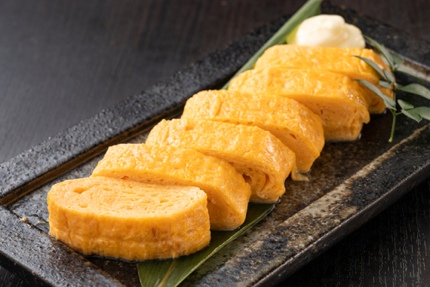
Eggs are at the centre (literally) of shakshuka, a tomato sauce-based dish with peppers and spices, such as smoky paprika, that originates in North Africa and the Middle East.
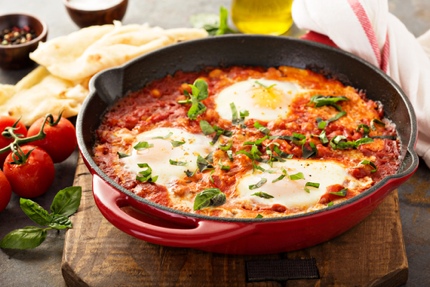
One of the more unique ways eggs are eaten in China and Korea is as a steamed egg ‘custard’, so-called because it has a silky, set texture, with the pale yellow hue of conventional custard, which you can scoop out and eat with a spoon.
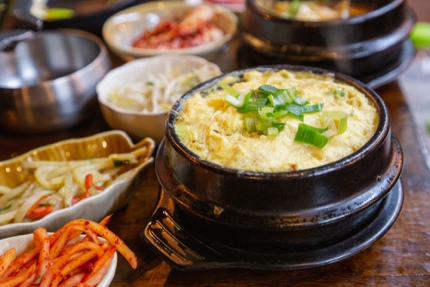
Other iconic eggy creations from across the globe include Russian stuffed eggs or deviled eggs, Scotch eggs from the UK (whole eggs wrapped in sausage meat and coated in breadcrumbs) and Sri Lankan egg hoppers (a paper-thin crepe ‘basket’ with an egg in the middle).
